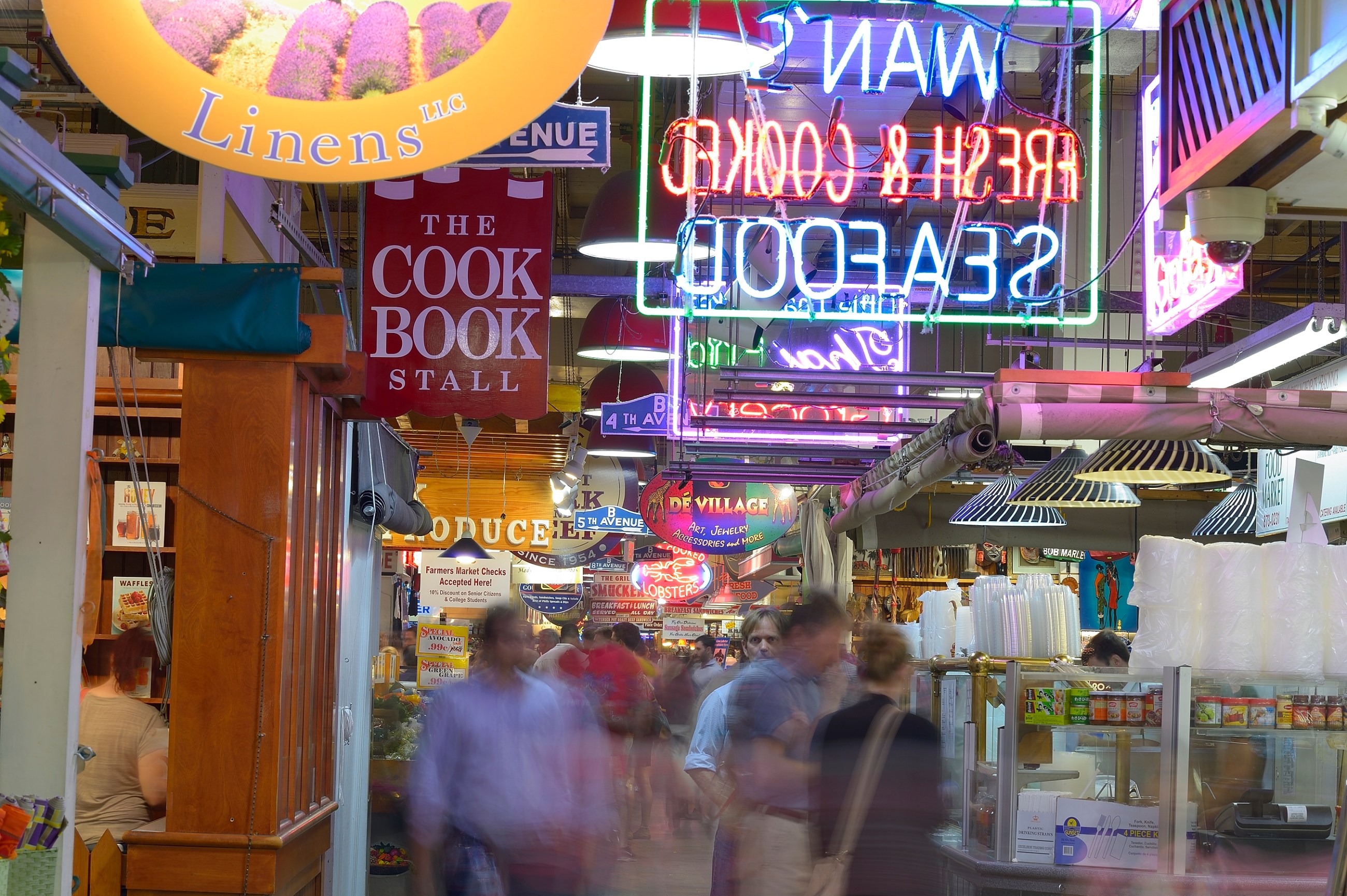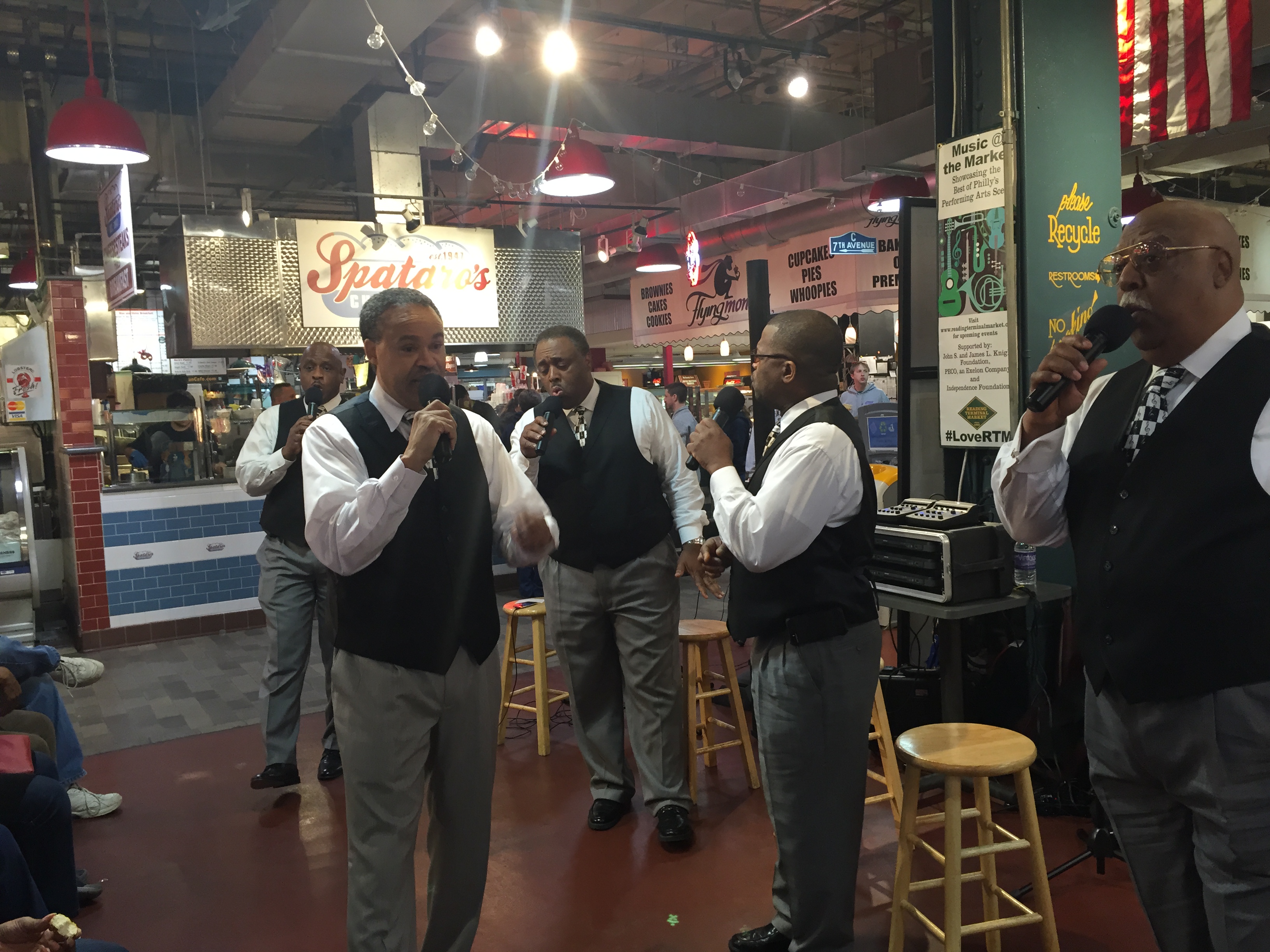
Reading Terminal Market presents performing arts at a crossroads for urban Philadelphia
Photos courtesy Reading Terminal Market.
Ann Mintz is the manager of development and special projects for Philadelphia’s Reading Terminal Market, a winner of Knight Arts Challenge Philadelphia to curate a performing arts series at the popular shopping venue.
A white-haired woman watches a group of salsa dancers, moving to the music. One of the dancers approaches her with an outstretched hand. She joins him on a dance floor that has been improvised by clearing a dozen tables and chairs from the middle of a busy public market. At the end of the dance, she smiles at me. “Nothing like this ever happens in North Dakota,” she says. “This will be my favorite memory of Philadelphia.”
A group of musicians from the world-famous Philadelphia Orchestra performs a pop-up concert, inviting market-goers to conduct the first movement of Mozart’s “Eine Kleine Nachtmusik.” They include a conventiongoer, a straw-hatted Amish man and an African-American teen. The teen, one of the musicians says, keeps the rhythm at least as well as a recent guest conductor.
An older, African-American man stops to listen to a traditional Appalachian-style string band. He catches my eye, beaming, and says, “Now that’s what I like to hear.”
Over the past 18 months, the Reading Terminal Market has been exploring how to expand its established performing arts series and present a curated series in the most diverse public space in Philadelphia. The market serves an average of 17,000 people every day.
It’s a mecca for foodies and one of the top venues in Pennsylvania for the redemption of SNAP vouchers (food stamps). Patrons are diverse in age, ethnicity, education and income. They are Philadelphia residents, city workers, jurors, business travelers and conventiongoers. Sociologist Elijah Anderson calls the market a “cosmopolitan canopy,” an island of civility in an often-fragmented urban landscape.
We’ve essentially upended the traditional model of arts outreach; instead of trying to bring people to arts venues, we’re bringing the performing arts to them. The effort is reminiscent of Knight Foundation’s Random Acts of Culture, which introduced the arts into unexpected places.
The marketplace has a broad and diverse audience. We’ve learned that it is impossible to predict who is going to respond to what kind of performance. People who are at the market for lunch will participate enthusiastically in an interactive game based on the food in Shakespeare’s plays. A sad and serious puppet show about homelessness and the need for human connection proves to be surprisingly successful. A performance by a local gospel group turns into an enthusiastic, hand-waving revival meeting.

PSALMS gospel quintet performs.
We’ve seen that children respond strongly to live music. Wide-eyed toddlers in strollers stare fascinated at drummers and piano players and cry when their parents move away. Preschoolers dance. One little girl, dressed in her Sunday best, threw her arms around the waist of a jazz diva, resplendent in African fabric, as she sang the songs of Billie Holiday, Dinah Washington and Sarah Vaughn. After the set, I asked the singer if she knew the child. “I never saw her before,” she replied. Everyone—everyone—loves the high-energy percussiveness of Philadelphia-style tap dance, and small children have to be restrained from joining the dancers on the floor.
The production is like a street performance. What we present has to have enough presence to attract an audience in a highly competitive environment, but it can’t be so overwhelming it interferes with the market’s primary business. After all, our merchants need to make a living. And we’ve learned that presence does not necessarily equal volume; the puppet show was quiet and understated, but its universal themes and emotional power communicated strongly with the 35 people who sat, riveted, for the entire 15 minutes.
We don’t know whether these unexpected close encounters will transform people into regular consumers of the performing arts. We do know that people do respond when they experience performing arts in this context, without any preconceived expectations and without barriers of any kind. Reading Terminal Market plans to continue to provide this opportunity for our city, and we invite you to join us and make this discovery for yourself.
For more about Reading Terminal Market, visit readingterminalmarket.org or email [email protected].
Recent Content
-
Artsarticle ·
-
Artsarticle ·
-
Artsarticle ·
